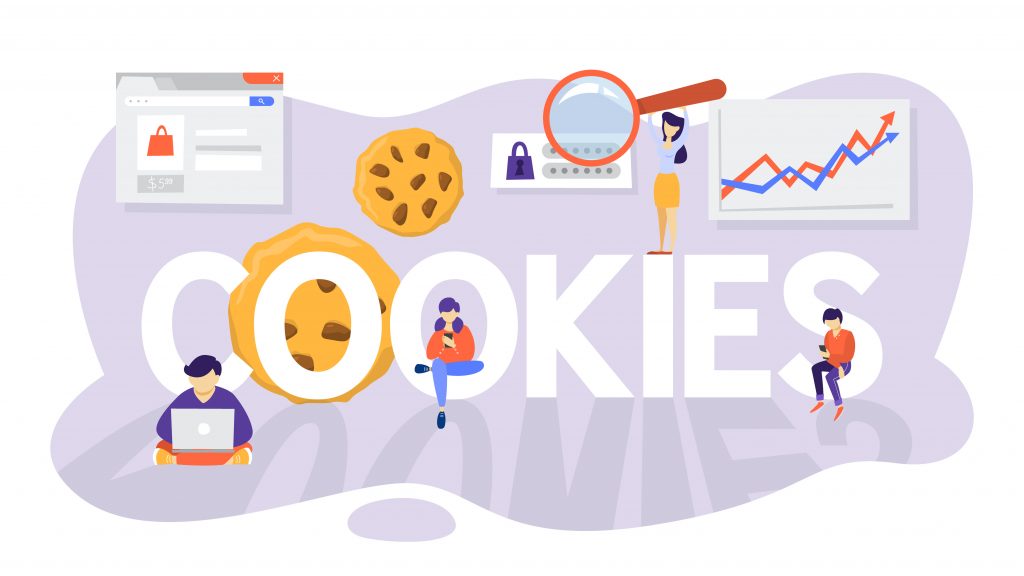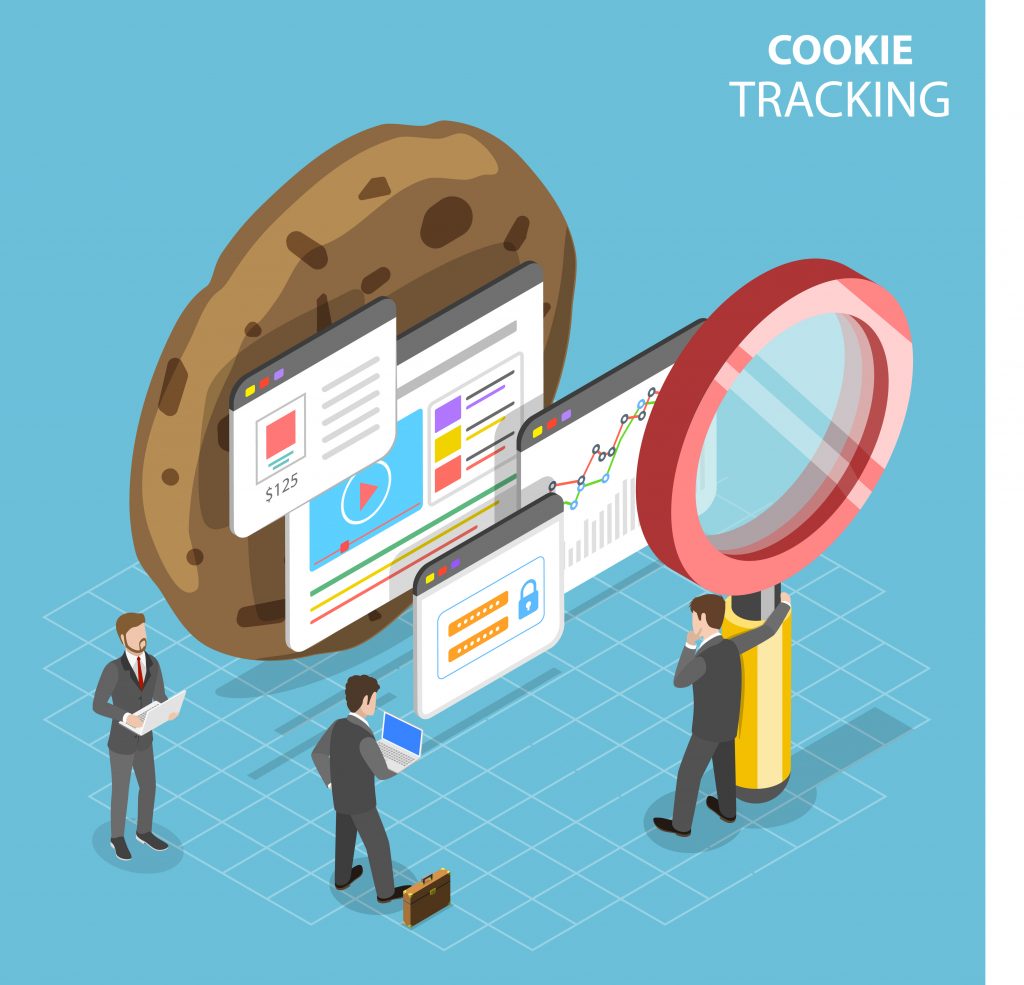
If you work in advertising or have spent time online over the last decade, you have likely heard of cookies.
Cookies are text files that contain small pieces of data. Third-party websites typically use cookies to track visitors, derive demographics, and create more targeted ad campaigns.
But recently, Google threw the advertising world for a loop and announced that it would be phasing out cookies in 2024. This process is known as cookie deprecation, and it’s essential to understand if you work in advertising, operate your own company, or conduct any type of business online.
If you’re not sure what that means, you’re not alone. But it’s safe to say that a world without cookies will be a changed one indeed.
This guide contains everything you need to know about how third-party cookie deprecation will impact ads—and what you can do about it.
What is a Cookie?
When you navigate to a new website, you are often met with a pop-up ad (or hover ad) that requests that you accept all cookies. Most of us click “yes” without even thinking about it. But what, exactly, is a cookie?
Cookies are a core component of the digital ecosystem. They are text files that contain small pieces of data. They are digital marketing tools generated on a web server to identify your computer and select personal data. Many types of cookies, including HTTP cookies, identify users to improve the browsing interface.
Your server will generate the cookie and label it with a custom identification system. Once that cookie is sent to the browser or advertiser, they can collect user data, make more informed decisions about your user experience, and provide personalized, curated information.
Two types of cookies are differentiated based on who collects the cookie data.
- First-Party Cookies are cookies a website owner places on their site to collect and store information. These types of cookies are typically generated to improve user experience and manage identifiers, such as your username and password, the contents of your cart, and which parts of the site you spend the most time on. The type of data they collect is known as first-party data.
- Third-Party Cookies are installed by someone other than the website owner. They collect and store information for a third party—typically within the advertising industry—and attribute third-party data to your computer. They are placed on several websites, such as social media platforms or merchants like Amazon. The website owner reaches an agreement with advertisers wherein they receive compensation in exchange for enabling cookies on the site. From there, the advertising network creates and launches ads based on your preferences.
The header that informs you of cookies typically states whether the cookie is attributed to a first or third-party source.
How Are Cookies Used?
Cookies are relatively simple. They work by embedding JavaScript code from one website to another, storing data that helps websites and companies make more strategic decisions about ad targeting. There are two kinds of cookies: “persistent cookies,” which save data over time and between browsing sessions, and “session cookies,” which expire at the end of your browsing session.
Cookies have a broad range of functionalities.
Website owners leverage HTTP cookies to collect important data and streamline the user experience.
First-Party Cookie Use
First-party cookies are generated by a server and collected by the website you are currently visiting. These types of cookies exist to help you have a better cross-site experience.
Providers may use first-party cookies to:
- Recognize your computer when you visit a site or browser
- Optimize the website’s user interface
- Optimize the web design of the site
- Track you cross-site to determine your behaviors
- Maintain important account information, such as your username and password
- Remember the items in your shopping cart
- Analyze the use of the site by visitors
- Personalize the contents of the place for you, affecting things like ad targeting
First-party cookies are likely here to stay, but third-party cookies face deprecation from Google and other companies.

Third-Party Cookie Use
Third-party cookies are a digital marketing tool leveraged by ad tech companies to enable contextual advertising. These types of cookies are regarded as “non-essential” because they do not directly contribute to your browsing experience but enable a third party to collect data for retargeting ads.
Third-party cookies are thus typically used to collect information about you as you navigate one site to another. They learn your consumer behaviors to empower advertising networks to create better ads that suit your interests.
Third-party cookies are a massive advantage in providing companies with the information they need to reach you better, driving conversions. Their disappearance may mean significant profit losses for advertising networks and website owners.
Compromised Future for Third-Party Cookies
The use of cookies has been hotly debated throughout the history of the internet.
Although cookies in and of themselves are relatively harmless, many consider them invasions of consumer privacy.
Additionally, cookies can fall into the wrong hands—particularly if you are surfing an unsecured WiFi network—and they can allow sensitive information to fall into the possession of hackers and other nefarious actors. Once they have your personal information, they can access your data, purchase items from your accounts, and compromise your digital safety.
Due to a resurging interest in data privacy, the debate around cookies has resurfaced once more. In 2017, the major browser Firefox blocked third-party cookies to respond to customer pushback against using cookies. In 2020, Safari blocked all third-party cookies as well. Apple has also blocked most third-party cookies with its latest Intelligent Tracking Prevention feature (ITP) update.
Governments soon followed suit. In 2021, the European Commission intended to ban third-party cookies from all sites. The existing EU General Data Protection Regulation (GDPR) was updated to reflect these changes later that year, prohibiting web browsers from collecting personal information.
Progress has been slower in the United States. While some individual companies have moved to phase out third-party cookies, advertisers benefit from extensive legal protections in the United States.
However, some states have proceeded with specific laws and regulations that work to protect consumer rights from privacy invasion. The California Consumer Privacy Act (CCPA), for example, was passed in 2020 and grants consumers the right to:
- Know about the information collected about them
- Delete their personal information from databases
- Opt out of sharing personal information
After years of debate, Google finally announced its intentions to phase out third-party cookies on Google Chrome. The process was delayed for several years as Google began to explore new options for governing cross-site user experience and providing targeted ads.
As of 2024, Google will phase out 1% of third-party cookies from Chrome Browser users—and will presumably continue to do so.
Google formed the Google Privacy Sandbox to discuss collecting use cases without compromising the safety of consumers. These proposals were established to empower developers with the tools needed to develop new technologies to replace cookies.
The Google Privacy Sandbox proposals resulted in several attractive new options for tracking user data.
The Federated Learning of Cohorts (FLoC) is one such technique. It protects individual users by grouping them, preventing personal information from being attributed directly to them. These groups are called cohorts.
Ultimately it seems that third-party cookies will be a thing of the past—so what do we do about it?
How Will Cookie Deprecation Impact Digital Advertising?
The death of third-party cookies has provoked much apprehension among marketing teams and advertising networks since Google announced the proposal in 2022.
A new research study from Episolon found that most marketers are concerned about the disappearance of cookies because they believe that their customer acquisition strategies will not be less efficient.
Because advertisers depend upon third-party cookies to reach customers, the disappearance of cookies could prevent companies from communicating correctly. According to the American Association for Advertising Agencies, the loss of cookies would significantly disrupt the internet’s infrastructure, causing chaos and preventing brands from reaching consumers. In response, Google has maintained that first-party cookies will remain intact and should suffice to direct a consumer’s experience on a given website.
Additionally, digital media companies worry that they won’t be able to craft targeted ads without using cookies. The American Association of Advertising Agencies maintains that this could lead to economic collapse in the advertising industry, causing companies to choke without the pipeline of revenue that emanates from cookies.
This fear isn’t baseless; after the European Union passed regulations banning third-party cookies, foreign websites began to lose significant revenue, unable to continue funneling ads into the consumer space.
Additionally, websites like Google Analytics, which depend upon cookies, began to report inaccurate information, causing marketers to worry that they might need more data they need to conduct operations.
Another result that this development could have is manipulating competition among advertisers. Because some advertisers will be affected earlier than—and more than—others, Google’s new move could stymie healthy competition and prevent some brands from generating revenue to the same degree as others.
As a result of both problems, advertisers will have to identify new means of collecting information and creating targeted ads.
Some have predicted a rise in contextual advertising. Contextual advertising is when brands target their ads based on other content. For example, advertisers might place their ads on a website or social media platform that caters to a particular audience.
Others suggest that brands use APIs to complete data collection. APIs allow advertisers to share data safely and efficiently. Facebook has already implemented the Conversions API to have a failsafe once cookies become obsolete.
Still, others will likely rely on first-party data from primary sources such as Google, Facebook, and Amazon.
Lastly, to address the concerns of many marketing teams, Google has established an aggregated browser grouping system that will go into effect throughout the year. However, we do not know how productive this system is, leaving many advertisers wondering what to do next.
Ultimately, it is clear that there will be a coming shift in advertising—but marketers are preparing for it.
Many are devising new data collection, targeting, and performance systems. Some implement identity solutions such as Unified ID 2.0, Google Chrome APIs, and ID5. Others are using contextual partners—some plan to rely solely on first-party data to conduct their digital marketing operations.
Although the digital landscape will almost certainly change due to the elimination of third-party cookies, advertisers will likely find a way to mitigate the most harmful effects of this new policy.

Conclusion
The deprecation of third-party cookies is a concern to many.
Cookies function by harnessing essential customer data and allowing brands and advertisers to make strategic decisions based on that data. Many brands rely on third-party cookies to optimize their websites, undertake digital marketing operations, place targeted ads, and understand their consumer base.
Growing concerns over user privacy have led governments and companies to impose strict regulations banning third-party cookies across the web.
As a result, many are worried about advertising in a cookieless world.
As Google plans to phase out third-party cookies—following in the footsteps of other major browsers like Firefox and Safari—marketers are scrambling to find another data strategy to replace the one that has governed the digital landscape for years.
Ultimately, change is hardly new. The world of technology has been marked by change since its inception, which is typical for industry fluctuations.
Advertisers might leverage first-party data to compensate for these changes to obtain important information about their consumer base. They might rely on APIs to transmit information and depend more heavily on contextual advertising to reach the right consumers.
Lastly, Google doesn’t plan to leave its advertisers in the dust. The company has developed a new data strategy—the Federal Learning of Cohorts—to meet the needs of its advertisers in the interim.
Only time will tell how these new strategies serve the advertising world. But until then, buckle up and prepare for an interesting next few months.

